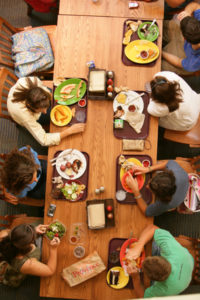Dining
Vanderbilt Campus Dining is a non-profit, university-managed auxiliary service. As such, it chooses to offer sustainable food choices to Vanderbilt students, employees, and campus visitors. VU Dining’s “Eat the World, Save the Earth” program is designed to give the campus community and visitors information about kitchen principles and how they affect individuals, the environment, and individual and society’s well being.
Menus of Change Research Collaborative
Vanderbilt has been awarded membership in the Menus of Change University Research Collaborative (MCURC). Co-founded and jointly led by Stanford University and the Culinary Institute of America (CIA), the Menus of Change University Research Collaborative is a working group of leading scholars, foodservice business leaders, and executive chefs from invited colleges and universities who are accelerating efforts to move Americans  toward healthier, more sustainable, plant-forward diets. The MCURC Principles of Healthy, Sustainable Menus provide guidance to Campus Dining menus.
toward healthier, more sustainable, plant-forward diets. The MCURC Principles of Healthy, Sustainable Menus provide guidance to Campus Dining menus.
In 2019, Vanderbilt Dining has initiated a MCURC advisory committee with three working groups:
- Single Use Plastics Elimination Working Group
- Food Waste Reduction Working Group
- Community Garden Working Group
To get involved with any of these advisory groups, please contact David Ter Kuile at david.terkuile@vanderbilt.edu
Sustainable Food Practices
- Menus are seasonal, adjusting to foods which are available locally. Whenever possible, local and organic produce and vegetables are used.
- A vegetarian entrée is available at each meal and there are identifiable icons defining food choices as organic, vegetarian, vegan, etc.
- 100% canola oil is used in all fryers, and fry oil is recycled.
- All foods served in Vanderbilt Dining facilities are MSG free.
- Our coffee is organic, local, and fair trade.
- Organic products are offered in all Munchie Marts
- All beef burgers are now blended burgers with 25% mushrooms, which saves 700 lbs of beef per month.
- Soy milk and yogurt is offered at most locations
- Fish is sourced utilizing the Monterrey Bay Seafood Watch guidelines to ensure the most sustainable seafood is purchased and served
- Serve only cage free eggs
Waste Reduction
- Campus dining has eliminated plastic straw use.
- Post-consumer food waste generated at The Commons Dining Center is placed in a pulper for volume reduction and removal of liquids, reducing food waste volumes by 85%.
- All dining centers have a compost program that collects food waste to be processed into compost.
- Rand Dining Center uses ORCA digester to reduce food waste going to a landfill in addition to composting initiatives.
- Vanderbilt Dining diverts leftover food from the landfill by donating to the Second Harvest Food Bank. In addition, leftover strawberries from commencement celebrations are donated to the Nashville Zoo.
- To-go cups, plates, and cutlery provided in Vanderbilt Dining facilities are all recyclable or compostable.
- Hydration Stations around campus offer touch-free, filtered water for students to fill up reusable water bottles.
- All pre and post-consumer waste is weighed using Lean Path system which records the information in a cloud base system allowing for department wide analytics and waste analysis
- Participant in the Mayor’s Food Saver Challenge
